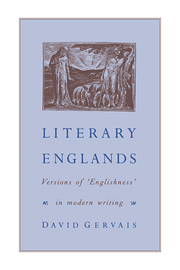Book contents
- Frontmatter
- Contents
- Preface
- Acknowledgements
- Abbreviations
- 1 The nineteenth century: pastoral versions of England
- 2 Edward Thomas: An England of ‘holes and corners’
- 3 Forster and Lawrence: exiles in the homeland
- 4 Late witness: George Sturt and village England
- 5 Contending Englands: F. R. Leavis and T. S. Eliot
- 6 Englands within England: Waugh and Orwell
- 7 Larkin, Betjeman and the aftermath of ‘England’
- 8 Geoffrey Hill and the ‘floating of nostalgia’
- Afterword: A homemade past
- Index
3 - Forster and Lawrence: exiles in the homeland
Published online by Cambridge University Press: 15 October 2009
- Frontmatter
- Contents
- Preface
- Acknowledgements
- Abbreviations
- 1 The nineteenth century: pastoral versions of England
- 2 Edward Thomas: An England of ‘holes and corners’
- 3 Forster and Lawrence: exiles in the homeland
- 4 Late witness: George Sturt and village England
- 5 Contending Englands: F. R. Leavis and T. S. Eliot
- 6 Englands within England: Waugh and Orwell
- 7 Larkin, Betjeman and the aftermath of ‘England’
- 8 Geoffrey Hill and the ‘floating of nostalgia’
- Afterword: A homemade past
- Index
Summary
Forster has had a good press because, for many years, he offered intellectuals the image of England they wanted. Lawrence, who included some of the same Liberal faith in his make up, offended them by doing the opposite. The kind of character satirised in Women in Love – Hermione or Sir Joshua – usually wins Forster's cautious sympathy. This is one reason why Forster was more influential on the Auden generation than Lawrence was. It may also explain why Forster has been persistently pardoned for precisely the fault which has most damaged Lawrence's reputation as a novelist: the tendency to make first-person intrusions into his fictions. Some intrusions are more intrusive than others. It is one thing to be interrupted by one of one's own kind – genial, modest and urbane – but another to be on the end of a tirade that is both impolite and disturbingly ad hominem. Who could object to a narrator as insinuating as Forster? As Virginia Woolf said, he has ‘a vision which he is determined that we shall see’ but he reminds us of it very gently: ‘we are tapped on the shoulder’. Perhaps it has only been since his death, now that his ‘charm’ is more distant, that it has become clear that the task he sets the reader of his novels is to establish exactly what that ‘vision’ was.
- Type
- Chapter
- Information
- Literary EnglandsVersions of 'Englishness' in Modern Writing, pp. 67 - 101Publisher: Cambridge University PressPrint publication year: 1993



